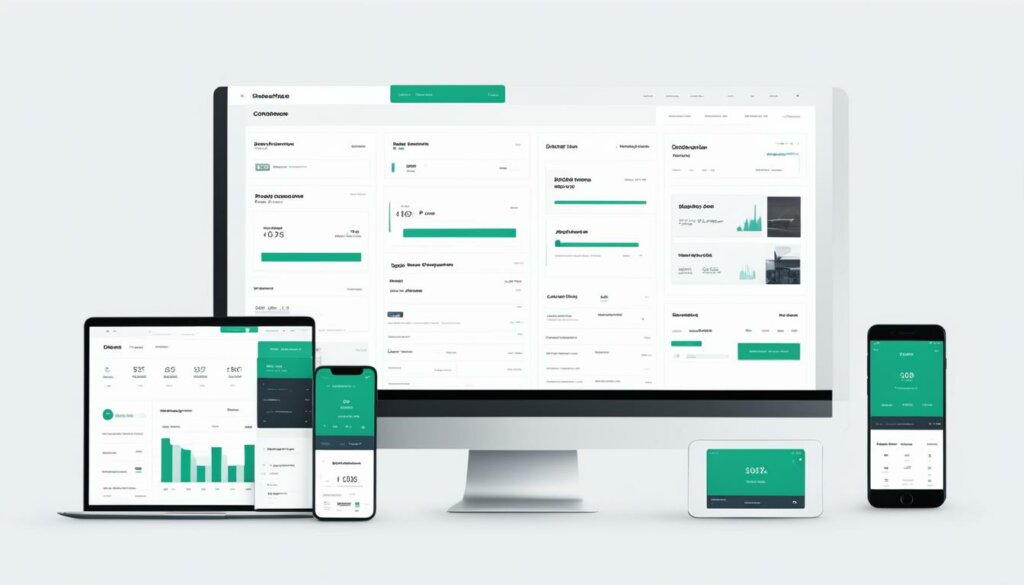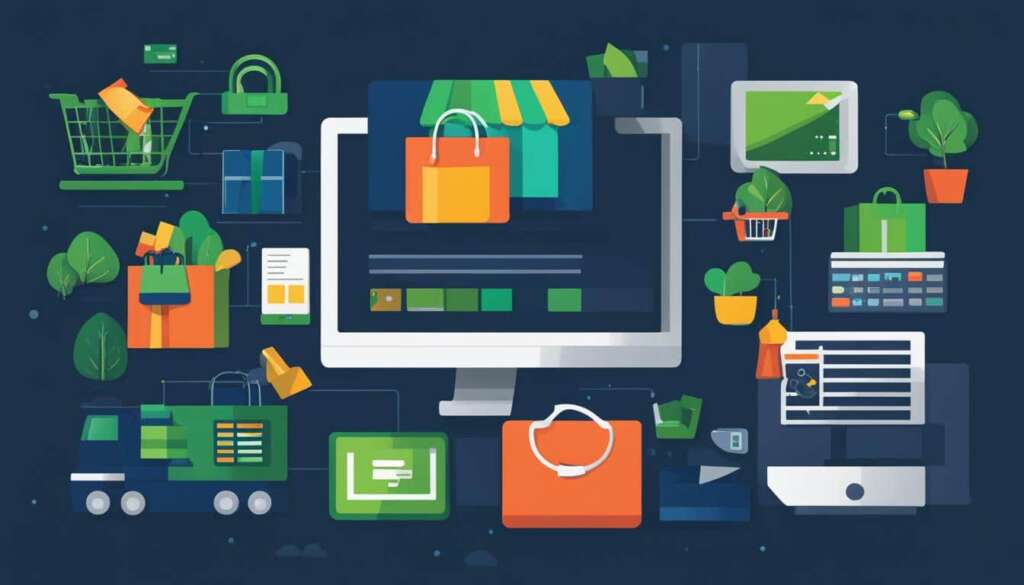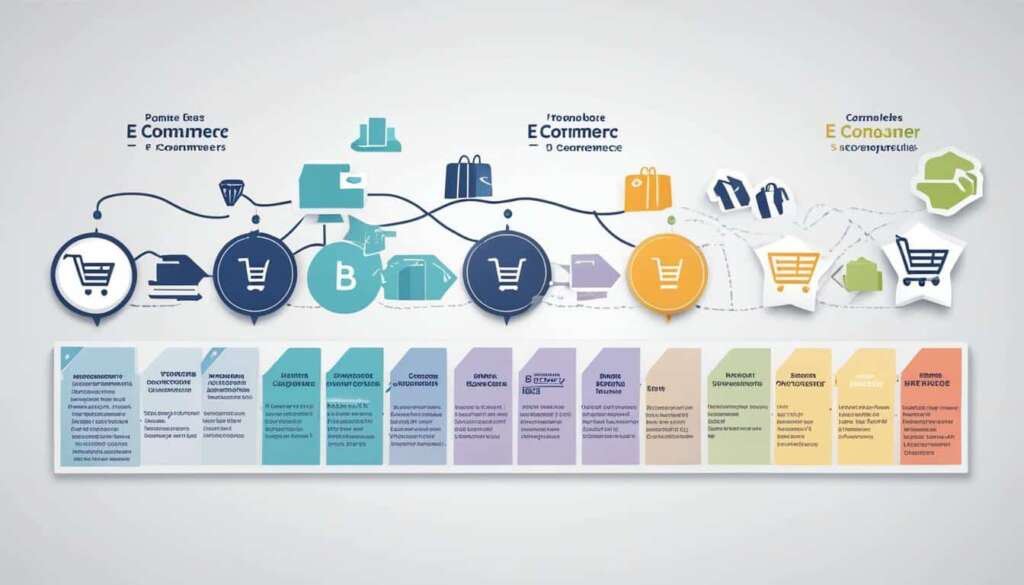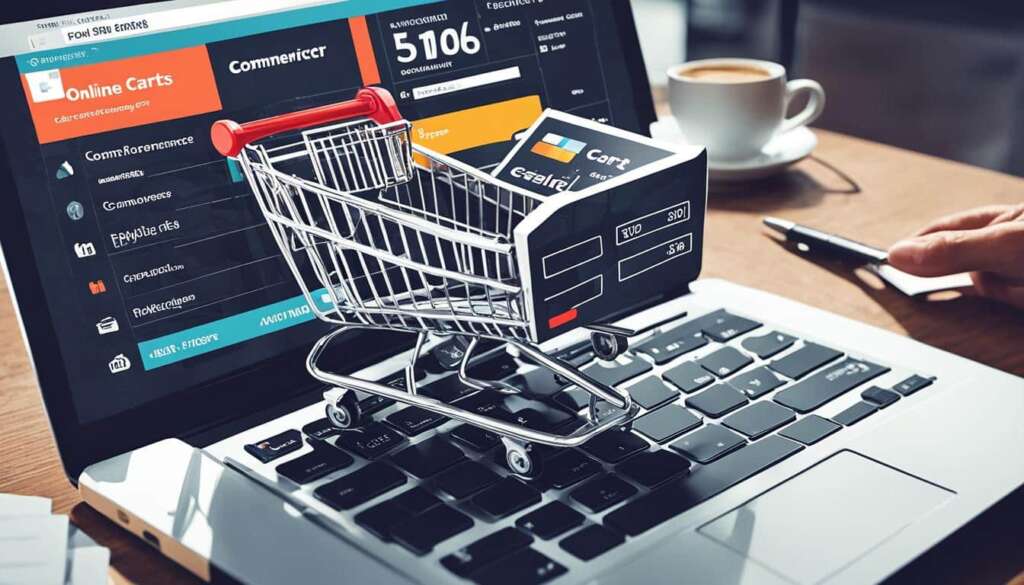Table of Contents
B2B e-commerce, or business-to-business electronic commerce, is the backbone of online business transactions between businesses. It involves the buying and selling of goods or services through online platforms. B2B e-commerce has revolutionized the way B2B sellers operate, improving efficiency and effectiveness in the process. With the rise of digital technologies, B2B companies are embracing e-commerce to meet the changing expectations of customers, particularly millennials, who seek the same seamless experiences offered by B2C sellers. The B2B e-commerce market is experiencing rapid growth, with projected values reaching trillions of dollars.
To stay ahead of the competition, B2B sellers need to understand the fundamentals of B2B e-commerce, its different types, and the stages of business growth. This knowledge will enable them to develop effective marketing tactics and leverage the benefits of using a B2B e-commerce platform. By adapting to the changing landscape of B2B e-commerce, businesses can thrive and position themselves for success in the online marketplace.
Types of B2B E-Commerce
In the world of B2B e-commerce, various types cater to the unique needs and requirements of businesses. Let’s explore the different forms that B2B e-commerce takes:
B2B2C
In B2B2C e-commerce, businesses have the opportunity to directly sell their products to end consumers, eliminating the need for intermediaries or middlemen. By bypassing traditional distribution channels, businesses can establish a stronger connection with their customers and gain a better understanding of their needs and preferences.
For example, popular brands like Coca-Cola and Procter & Gamble have successfully implemented B2B2C strategies, allowing them to extend their reach and establish a direct relationship with consumers.
Wholesale
Wholesale B2B e-commerce involves selling goods in bulk to other businesses at lower prices. This type of e-commerce allows manufacturers and distributors to cater to the needs of retailers, resellers, or other businesses that require a large quantity of products.
Wholesale B2B e-commerce helps streamline the supply chain, minimize costs, and facilitate the smooth flow of goods from manufacturers to end consumers. It is a vital component of the B2B ecosystem.
Manufacturers
Manufacturers play an essential role in B2B e-commerce. They produce finished goods and sell them to suppliers, wholesalers, or other manufacturers. Manufacturers often collaborate closely with distributors to ensure that their products are effectively promoted and reach the end customer.
For instance, automotive manufacturers like BMW and Ford have established robust B2B e-commerce networks to distribute their vehicles, parts, and accessories to suppliers and dealerships worldwide.
Distributors
Distributors are intermediaries between manufacturers and customers. They work closely with manufacturers to promote sales and move products along the distribution chain. Distributors offer a range of services, including inventory management, marketing, and logistics.
Notable distributors in the B2B e-commerce landscape include companies like Sysco, which specializes in foodservice distribution, and Grainger, known for its extensive line of industrial supplies.
It is important to note that many B2B businesses operate in multiple categories simultaneously. For example, a manufacturer may also engage in wholesale activities or establish a B2B2C channel to cater directly to end consumers.
Understanding the various types of B2B e-commerce is crucial for businesses aiming to thrive in the digital marketplace. By leveraging the right type of B2B e-commerce, companies can optimize their sales strategies, enhance customer relationships, and drive business growth.
The following table provides an overview comparison of the B2B e-commerce types:
| B2B E-Commerce Type | Definition | Main Characteristics | Examples |
|---|---|---|---|
| B2B2C | The direct sale of products from a business to the end consumer, bypassing middlemen. | Direct customer connection, deeper understanding of customer needs and preferences. | Coca-Cola, Procter & Gamble |
| Wholesale | Selling goods in bulk at lower prices to other businesses. | Supply chain optimization, cost reduction, facilitation of bulk purchasing. | Amazon Business, Alibaba |
| Manufacturers | Produce finished goods and sell them to suppliers, wholesalers, or other manufacturers. | Strong control over product quality and branding, collaboration with distributors. | BMW, Ford |
| Distributors | Work closely with manufacturers to promote sales and move products along the distribution chain. | Expertise in marketing and logistics, efficient inventory management. | Sysco, Grainger |
Stages of B2B Business
B2B businesses go through distinct stages of growth. Understanding these stages is crucial for success in the ever-evolving world of B2B e-commerce. Let’s explore each stage in detail:
1. Startup Stage
The startup stage is where it all begins. Here, B2B brands are launched, and initial sales are made. Market research is conducted to identify target markets, customer needs, and competition. This stage sets the foundation for the business’s future growth.
Challenges: Building brand recognition, establishing a customer base, and managing initial financial constraints.
2. Growth Stage
The growth stage is marked by increasing sales, expanding marketing efforts, and building strong customer relationships. B2B businesses focus on capturing a larger market share and improving profitability.
Challenges: Scaling operations, managing increased demand, and staying ahead of competition.
3. Expansion Stage
In the expansion stage, B2B businesses experience rapid growth and diversification. They explore new markets, expand product offerings, and invest in innovative strategies to gain a competitive edge.
Challenges: Evaluating market opportunities, adapting to new market dynamics, and managing complex operations.
4. Maturity Stage
The maturity stage is characterized by stable sales, brand expansion, and strategic decision-making. B2B businesses have established a strong presence in the market and focus on long-term sustainability.
Challenges: Sustaining growth, evolving with changing customer needs, and maintaining a competitive position.
Each stage of B2B business growth requires specific strategies to overcome challenges and ensure continued success. By understanding these stages, businesses can navigate their journey and make informed decisions.
Now, let’s take a closer look at these stages through a table that summarizes key characteristics:

| Stage | Characteristics | Challenges |
|---|---|---|
| Startup | Brand launch, initial sales, market research | Building brand recognition, establishing a customer base, managing financial constraints |
| Growth | Increasing sales, expanding marketing efforts, building customer relationships | Scaling operations, managing increased demand, staying ahead of competition |
| Expansion | Rapid growth, diversification, exploration of new markets | Evaluating market opportunities, adapting to new market dynamics, managing complex operations |
| Maturity | Stable sales, brand expansion, strategic decision-making | Sustaining growth, evolving with changing customer needs, maintaining a competitive position |
B2B E-Commerce Marketing Tactics
Effective marketing strategies are essential for the success of B2B e-commerce businesses. To attract and retain customers, B2B sellers must prioritize delivering exceptional customer experiences, personalized interactions, and leveraging data analytics. The customer experience holds great importance throughout the B2B buying journey, and providing a seamless and personalized experience can significantly impact purchasing decisions. Utilizing analytics enables businesses to gain insights into customer behavior and preferences, empowering them to conduct targeted marketing campaigns and make informed decisions.
Delivering Outstanding Customer Experiences
When it comes to B2B e-commerce, customer experience is a key differentiator. B2B buyers expect the same level of convenience, ease, and personalization that B2C sellers offer. By focusing on improving the user interface, providing intuitive navigation, and streamlining the buying process, B2B sellers can create a positive and memorable customer experience. Personalization also plays a crucial role, as B2B buyers often have unique requirements and preferences. Customizing product recommendations, content, pricing, and communication helps businesses build stronger relationships and enhance customer satisfaction.
Leveraging the Power of Data Analytics
Data analytics plays a critical role in B2B e-commerce marketing. By analyzing customer data, businesses gain valuable insights into customer behavior and preferences. This information allows for targeted marketing campaigns that are more likely to resonate with and engage the target audience. Analytics also helps optimize pricing strategies, inventory management, and demand forecasting. By accurately understanding customer needs and market trends, B2B sellers can make data-driven decisions that contribute to business growth and success.
“Data analytics enables businesses to gain valuable insights into customer behavior, empowering them to conduct targeted marketing campaigns and make informed decisions.”
Implementing Personalized Interactions
Personalization goes beyond product recommendations. B2B sellers can personalize interactions by tailoring communication, providing relevant content, and offering customized pricing. B2B buyers appreciate the ease and efficiency that comes with tailored experiences, making them more likely to choose and remain loyal to a specific seller. Personalized interactions strengthen relationships, increase customer retention, and foster long-term business partnerships.
By incorporating B2B e-commerce marketing tactics such as delivering outstanding customer experiences, leveraging data analytics, and implementing personalized interactions, businesses can effectively reach their target audience, drive customer engagement, and achieve greater success in the competitive online marketplace.
B2B E-Commerce Myths
Despite the rapid growth of B2B e-commerce, there are still some misconceptions that persist in the industry. It’s important to debunk these myths and gain a proper understanding of the challenges and opportunities that come with digital transformation.
“B2B buyers are not interested in online purchasing.”
Contrary to this misconception, B2B buyers are increasingly embracing online purchasing options. As more B2B sellers expand their presence in the digital space, buyers expect the convenience and efficiency of online transactions. With the availability of comprehensive product information, competitive pricing, and streamlined purchasing processes, B2B e-commerce offers a compelling value proposition for buyers.
“Transitioning to e-commerce is too challenging for B2B businesses.”
While digital transformation does present its challenges, the benefits of B2B e-commerce far outweigh the perceived difficulties. Embracing e-commerce enables B2B businesses to improve operational efficiency, reduce costs, and reach a wider customer base. By leveraging online platforms, businesses can automate sales processes, enhance customer experiences, and streamline order fulfillment. With the right strategies and technology partners, transitioning to e-commerce can be a smooth and rewarding journey for B2B sellers.
To succeed in the digital landscape, it’s crucial for B2B sellers to overcome these misconceptions and capitalize on the opportunities presented by e-commerce. By embracing digital transformation, businesses can stay competitive, meet the evolving needs of their customers, and drive growth in the B2B e-commerce space.
Challenges and Opportunities in B2B E-Commerce
| Challenges | Opportunities |
|---|---|
| Resistance to change | Improved operational efficiency |
| Complexity of implementation | Cost reduction |
| Integration with existing systems | Increased market reach |
| Data security concerns | Enhanced customer experiences |
Using a B2B E-Commerce Platform
Implementing a B2B e-commerce platform can revolutionize your business by providing a range of valuable benefits. With automated sales processes, businesses can improve efficiency and reduce manual tasks, freeing up time for more strategic activities. By automating repetitive tasks such as order processing and invoicing, sales teams can focus on building stronger customer relationships and driving revenue growth.
One of the key advantages of a B2B e-commerce platform is the ability to reduce infrastructure and overhead costs. By moving sales operations online, businesses can eliminate the need for physical stores or multiple regional offices. This cost-saving measure can have a significant impact on a company’s bottom line, allowing for greater investment in other areas of business development.
Furthermore, using a B2B e-commerce platform can help improve partner relationships and collaboration. These platforms often provide features such as real-time inventory visibility and order tracking, allowing partners to have greater transparency and control over the supply chain. With streamlined communication and access to shared data, businesses can cultivate stronger relationships with suppliers, distributors, and retailers.
A B2B e-commerce platform also offers scalability, enabling businesses to grow and expand their operations. As the platform can handle increased sales volume and customer demand, businesses can easily scale up their operations without the need for significant investments in additional resources or infrastructure.
Additionally, a B2B e-commerce platform provides businesses with a centralized and efficient system for managing all aspects of sales, inventory, and customer interactions. This centralized system allows for seamless integration with existing business systems such as CRM or ERP, streamlining processes and improving overall business performance.

Some of the key features that a B2B e-commerce platform can offer include:
- Sales automation: Streamline the sales process from order placement to fulfillment, reducing manual errors and improving overall efficiency.
- Personalized pricing: Implement dynamic pricing strategies based on individual customer profiles and purchase history, ensuring competitive and personalized pricing.
- Bulk ordering: Simplify the buying process for customers by allowing them to place bulk orders and easily manage their inventory.
- Integration with other systems: Seamlessly integrate the e-commerce platform with existing business systems, such as CRM or ERP, for enhanced data visibility and improved decision-making.
A B2B e-commerce platform plays a crucial role in enabling businesses to effectively navigate the digital landscape and meet the evolving demands of B2B buyers. By leveraging these platforms, businesses can automate sales processes, reduce costs, strengthen partner relationships, and achieve scalability, leading to long-term success in the B2B e-commerce market.
Conclusion
B2B e-commerce is a rapidly growing sector that presents significant opportunities for businesses. As the market continues to evolve, it is crucial for B2B sellers to adapt to changing customer expectations and embrace digital transformation. By understanding the basics of B2B e-commerce, including the different types, stages of business growth, marketing tactics, and benefits of using a B2B e-commerce platform, businesses can position themselves for success in the online marketplace.
The future of B2B e-commerce looks promising, with continued growth and innovation driving the industry forward. As technology advances, future trends in B2B e-commerce are likely to focus on enhanced customer experiences, personalized interactions, and the integration of advanced analytics and artificial intelligence. B2B sellers that can effectively leverage these trends will be positioned to gain a competitive edge and achieve long-term success.
Adaptation is key in the ever-changing landscape of B2B e-commerce. Businesses that recognize the importance of adapting to new technologies, customer preferences, and market dynamics will be better positioned to thrive in the digital economy. Embracing digital transformation and continually evolving strategies will allow B2B sellers to meet the evolving needs and expectations of their customers, stay ahead of the competition, and maximize their potential in the B2B e-commerce market.
FAQ
What is B2B e-commerce?
B2B e-commerce refers to the sale of goods or services between businesses through online transactions.
Why is B2B e-commerce important?
B2B e-commerce improves buying efficiency and effectiveness, meets customer expectations, and is projected to account for a large percentage of B2B sales in the future.
What are the different types of B2B e-commerce?
The different types include B2B2C, wholesale, manufacturers, and distributors.
What are the stages of B2B business growth?
The stages are startup, growth, expansion, and maturity.
What role does marketing play in B2B e-commerce?
B2B e-commerce marketing focuses on customer experience, personalization, and data analytics to attract and retain customers.
What are some common misconceptions about B2B e-commerce?
Some misconceptions include the belief that B2B buyers are not interested in online purchasing and that transitioning to e-commerce is too challenging for B2B businesses.
What are the benefits of using a B2B e-commerce platform?
Using a B2B e-commerce platform offers benefits such as automated sales processes, cost reduction, improved partner relationships, and scalability.
What does the future of B2B e-commerce look like?
The future holds continued growth and innovation in the B2B e-commerce sector, making it crucial for businesses to adapt to changing customer expectations and embrace digital transformation.













